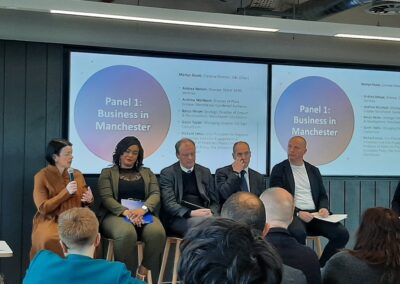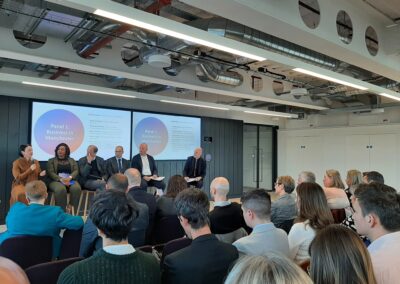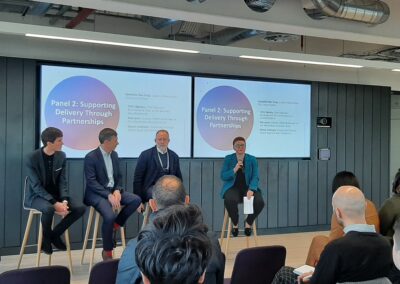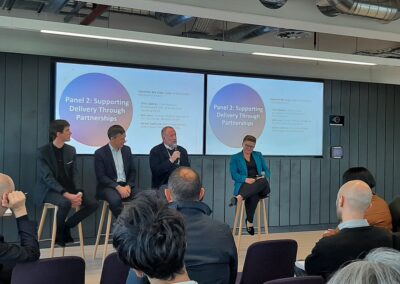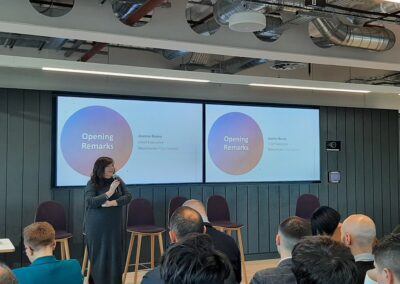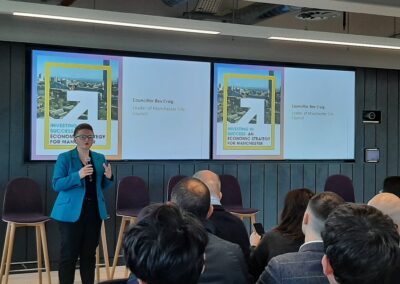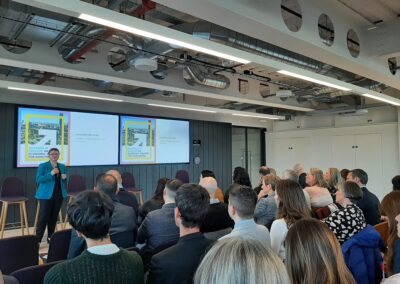On Tuesday 28 November 2023, Manchester City Council launched a new 10-year plan guiding how Manchester’s economy will grow and become more inclusive.
The refreshed economic strategy, Investing In Success, seeks to build on the foundations of the last 25 years or so which have seen Manchester transformed from post-industrial decline to being a dynamic city with a growing population, a larger and more highly skilled workforce and a more diverse economy – attracting talent, investment and visitors from all over the world.
Manchester’s population has risen from 503,000 in the 2011 Census to 607,000 (Manchester City Council estimate), which is a 20% increase in twelve years.
Manchester, and especially the city centre, plays a leading role in Greater Manchester’s economy which with an £86 billion a year GDP is similar to those of major world regional cities such as Vancouver, Lyon and Rotterdam and remains slightly larger than Birmingham’s.
Between 2011 and 2021 Manchester’s GDP per capita, a measure of output, has increased by 44 per cent from £35,739 to £51,330 – the largest increase of any of the UK’s major cities and any Greater Manchester district. The number of businesses has risen from around 17,000 to around 23,500 between 2011 and 2021 and the number of employees from 350,000 to 426,000 between 2011 and 2022.
There have been other markers of progress too. For example, more than 90% of Manchester’s schools are now rated good or outstanding – above the national average – and more of the city’s residents (45%) are now educated to degree level.
With these strong economic foundations established, Manchester City Council decided that now is the time to consider what future growth in Manchester should look like and how the economy can continue to grow in a way which is more inclusive and in line with the city’s commitment to becoming zero carbon by 2038.
Leader of Manchester City Council and Deputy Chair of GM Business Board Cllr Bev Craig said: “Manchester has seen remarkable change in recent decades. But we are clear that there’s more work to do to ensure that everyone in our city gets the benefits of Manchester’s economic growth. Our vision is clear – a thriving Manchester where every resident can share in the prosperity of a growing economy.
“That’s what this strategy is focused on, building on our existing strengths and some of the fastest growing sectors and making sure Mancunians are connected to ever-increasing opportunities. We don’t just want to support and attract businesses, we want them to play a positive role in the wider life of the city by acting as advocates for the things we need to become a fairer and more prosperous place – from inspiring and recruiting diverse local talent to paying decent wages to supporting the city’s zero carbon goals.”
The strategy has five priority themes:
Use investment and development to drive inclusive growth
Recognising that the city centre is the main driver of growth in Manchester and the wider city region and that growing the size of the city centre is fundamental to increasing Manchester’s overall prosperity. But at the same time ensuring high-quality liveable neighbourhoods across the city, with large-scale regeneration projects – for example around North Manchester Hospital/Victoria North and Wythenshawe Hospital – including economic assets that enable places to thrive.
Nurture thriving, productive and innovative sectors
Attracting investment in the highest growth and most productive sectors such as financial and professional services, tech and life sciences and growing and promoting current and future knowledge-intensive industries such as AI, cyber, FinTech and genomics while also developing the green economy.
Develop world-class infrastructure, places and talent
Planning and delivering the physical and digital infrastructure to support businesses and ensure the city is a great place to locate, and for workers to live in. This includes working with Transport for Greater Manchester to implement the Bee Network to connect more people to employment and training opportunities via public transport, cycling or other forms of active travel.
The city’s Housing Strategy – which is targeting 36,000 new homes by 2032 – at least 10,000 of them affordable – is also fundamental to this and includes increasing housing density in the places with the best transport connections.
Ensuring the city is a great place to live will also help retain and attract highly skilled talent.
Transition to a zero carbon and resilient economy
Supporting the city’s goal of becoming zero carbon by 2038 to combat, and adapt to, the impacts of climate change. ‘Green growth’ will create opportunities in areas such as housing retrofit, energy, transport and research but it’s just as important that other sectors are as sustainable as possible.
Measures such as developing a Manchester standard for net zero construction through the city’s new Local Plan will also contribute.
Include more people in economic opportunity
Connecting new businesses and investors with partners who can help them ensure training and employment opportunities for local people. Initiatives include bespoke community economic development plans for areas where large-scale regeneration projects are taking place to maximise local benefits. Continuing to maximise the social value of employment, for example through encouraging all employers to pay the Real Living Wage and to recruit locally wherever possible.
The strategy was launched at an event at Roku’s offices in Circle Square, showing an example of recent investment in the region and the city’s burgeoning tech sector.
Speaking at the launch event Joanne Roney, Chief Executive of Manchester City Council said “Manchester’s successful economic growth, its resilience, doesn’t happen by accident. It happens through a number of things. Firstly, having an ambition and a strategy that is honest about the challenges the city faces but about opportunities.
For plans to be delivered, the second core element of what makes Manchester special is collaboration with our private sector partners. Those partnerships are deep and meaningful. Whatever the plan is, whatever the partnerships are, you have to have the confidence that it will be delivered.”
Becca Heron, Strategic Director of Growth and Development at Manchester City Council said “What is great about the strategy is that it builds on our work over the past few decades and has redoubled on what we need to do.
“That clarity of vision is really important, and I do think there has been a consistency of growth across Manchester and Greater Manchester as well. There’s been strong leadership and ambition to deliver for our people.
“As a council, we know we can’t do this on our own. Our other role is as a convener and an enabler. Manchester is known for the strength of its partnerships and that’s where it plays out. Driving growth in our frontier sectors is about creating the partnerships, the ecosystems and the conditions to help these sectors grow.
“Part of this is about actively investing in and working in partnership to make sure that those benefits are spread more widely. Partly it starts in the early years and in schools but also making sure that the right skills and training are available at different points in life is fundamental.”
Bev Craig said, “Manchester’s ability to deliver has never been in doubt. When we talk about the exciting things that happen in our city, when we talk about prosperity, we need to talk about the purpose of prosperity. When we celebrate our successes, we also have to be honest about our challenges. In that population of 600 thousand people, we still have some work to do to make sure that everyone can benefit from the success of our city and that everyone thrives.
“What does the next 10 years look like? When I think about the level of growth in Manchester, one of the most exciting things is there’s at least another 10 – 15 years to grow at the scale we’re doing. With that, there should be excitement and pride. Manchester has not lost its energy, its buzz, its excitement. Hopefully, this strategy will outline where we’re going.
“If we want Greater Manchester to do well. If we want the Northwest of England to do well. If we want the North of England to do well, and if we want the UK to do well, we need cities like Manchester to do well. If we don’t think about the roles cities play in economic growth and driving prosperity, we run the risk of making the same mistakes of the past.”
The launch event for Manchester’s new Economic Strategy featured a keynote speech by Bev Craig and two panel sessions.
The first, chaired by Martyn Evans Creative Director of U&I was all about the role of business and the private sector in Manchester, and how the city enables these businesses to thrive. Joining the panel was Andrea Nelson, Director of SENSE SEND Services, Andrew McIntosh, Director of Place at Greater Manchester Combined Authority, Becca Heron, Strategic Director of Growth and Development at Manchester City Council, Gavin Taylor Managing Director of Far East Consortium and Rochard Jones Vice-President for Regional Innovation and Civic Engagement at The University of Manchester.
The panel discussed how growth can be more inclusive and how to drive investment into the places that need it most, as well as Greater Manchester’s devolution deal, commitment to building an attractive ecosystem for businesses and the importance of the region’s clear vision and strategy.
The second panel, chaired by Bev Craig, was all about the power of partnerships in supporting growth across the city centre. Joining the panel was Chris Oglesby Chief Executive of Bruntwood and Chair of the Business Sounding Board, Rob Jones, Director of KPMG and member of Our Manchester Business Forum and Steven Cochrane, Partnerships Director at the Oxford Road Corridor Partnership.
The panel discussed skills, innovation and how to maximise talent at every level as well as Manchester’s longstanding culture of collaboration.
As Rob Jones said, “Currently there’s a lot of things that aren’t coherent in the world, but a lot of things make sense in this city at the moment.”
To read ‘Investing In Success: An Economic Strategy for Manchester’ click here.

